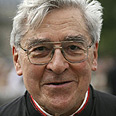
Jean-Marie Lustiger
צילום: רויטרס
The Jews' Catholic prince
The Jewish-born Lustiger wasn't Jews' envoy in Catholic word, but rather Church's envoy among Jews
PARIS – "Monsieur Cardinal, we have to leave for prayer," the young priest implored the old cleric. But Jean-Marie Lustiger stayed in the room overlooking the garden and continued to engage in a fascinating conversation in French, spiced with Yiddish. It appeared as if the old Church official preferred the company of the Israeli press over the evening mass that awaited him.
It was one of the last interviews granted by Paris' archbishop, who died Sunday, and he chose to give it to an Israeli newspaper. The meeting was held on the eve of his departure to Auschwitz as the personal representative of Pope John Paul II in the ceremony marking 60 years since the death camp's liberation.
In this event, Lustiger held a dual role: As Jean-Marie he represented the Pope; and as the child Aaron Lustiger he carried the painful memory of his mother, Gisele, who was murdered in Auschwitz after being deported from France by the Vichy government. "My children, what goes on here is a deadly disease, beware of it," she wrote her children in one of her last letters from Poland.
Young Aaron Lustiger found his own way of guarding himself. In 1940, at the age of 14, he converted to Christianity in the town of Orleans. He was sent there by his parents, who wanted to protect him, and found a new faith that remained with him until his death. His father, Charles, fought to bring him back to Judaism after the war, but failed.
Aaron became Jean-Marie and climbed the ranks of the Church until he became one of its "princes." He however kept the name Aaron in his identification card and was very proud of it. "This is my first name," he told me when we met at the Archbishop's house in Paris in the winter of 2005.
It was his Jewish name, but mainly his close ties with Pope John Paul II, that turned Lustiger into a key figure in the historic process of reconciliation between Judaism and Christianity. After the Second Vatican Council, which cleared the Jews of responsibility for the killing of Jesus, and before the establishment of ties between the Holy See and Jerusalem, the "Jewish cardinal" managed on many occasions to bring the two sides closer together. One example is his effort to resolve a crisis prompted by an attempt by Carmelite nuns to open a convent near Auschwitz in 1984.
It's hard to imagine who could fill the place of the Jewish kid Aaron, who became the mouthpiece of the Vatican on all issues concerning the Jews, in future crises.
Anti-Semitism on the fringes
Jews were very much mistaken in seeing Lustiger as their envoy in the Catholic world. In fact, he was the Church's envoy among the Jews. The Jews' Catholic more than the Catholics' Jew. His process of getting closer to the religion he abandoned (although he still considered himself Jewish, of course), was long, hard and strewn with unpleasant moments and words. "Have I felt anti-Semitism toward me in the Church? Only on the fringes, but I know it exists," he confessed.Things were not easy on the other side as well. When he arrived in Israel for an official visit in the 1990s, then-chief rabbi Yisrael Meir Lau – a Holocaust survivor himself - defined him as someone who "betrayed his people" during their darkest hour. As the years passed, the words became milder and Lustiger, who was once considered a proselyte, became an honored and welcomed guest in Israel.
This closeness to Judaism filled him with pride for religious and personal reasons. during our last conversation, just before he set out for Auschwitz, Lustiger talked about his many friends in Israel. He then turned quiet for a second, and said, "I sometimes ask myself if my father in Heaven can see this today." Now, when he's up there too, he can ask him himself.










